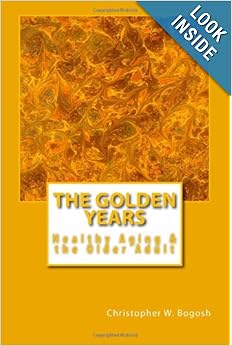
The Golden Years: Healthy Aging and the Older Adult by
Christopher W. Bogosh
This is the second book I’ve read by Chris on medicine, the
first was Compassionate Jesus. The
Golden Years is a deep look into the issues of older adults, aging, and end of
life issues. As other reviewers have indicated, the book’s goal is to ‘assist
the reader to live the “golden years” with the glory of God in view’
(125). The matters that are discussed in
the book include aging, healthy living, preventive healthcare, management,
health problems, and chronic health problems.
Rooting his message in a perceptive understanding of medicine and
through Christian convictions, Chris takes a unique approach in speaking about
issues surrounding older adults (6-7).
Chris points out an important idea in the chapter on Aging
by writing, “The desire to feel secure may have a positive effect by driving
the older adult to seek help, security in God, membership at a local church, and
assistance from local agencies, or it can drive the person to further
alienation, despair, depression, and even suicide. Feeling safe, un-threatened, and secure is
not only a legal right; it is an innate need God wants us to fulfill”
(19). I have sense this first in family as
the older adults in my extended family draw great comfort from investing time
in volunteer agencies and also in relationships with friends (card games,
dinner functions, etc.). It is easy to
lose sight of these available resources for relationships and companionship
when a person is wrangled by despair and loneliness. Yet, I think Christ is right in saying that
God created humans for each other and companionship provides emotional and
spiritual comfort.
The chapter on preventive healthcare was helpful in
understanding the good and bad of medication.
Chris writes, “When an older adult reports new signs of symptoms, one of
the first things the provider will do is rule out medication as a cause……..Medication
is a primary suspect when new problems occur, but is usually not the prescribed
drug itself causing the problem” (52).
Chris goes onto point out that a combination of factors like the person
not taking the medication or a bad interaction with other medicine. Careful monitoring is the way to check to see
if the medicine is doing its job and the person is taking responsibility. Another issue related to medicine is the
rising cost of drugs. With a fixed
income and senior adults spending at times over 200 dollars a month for medication,
rising costs of medicine can be a real problem.
Overall, I think the book was very informative is sometimes
downright boring. Yet, I think there is plenty
here to digest concerning all the issues of older adults.
Thanks to Good Samaritan Books and Cross Focused Reviews for
the copy of this book in exchange for an honest review.
Comments
Post a Comment